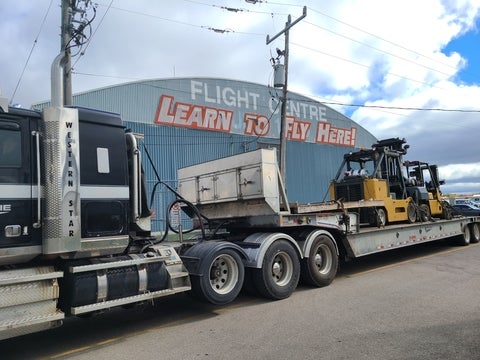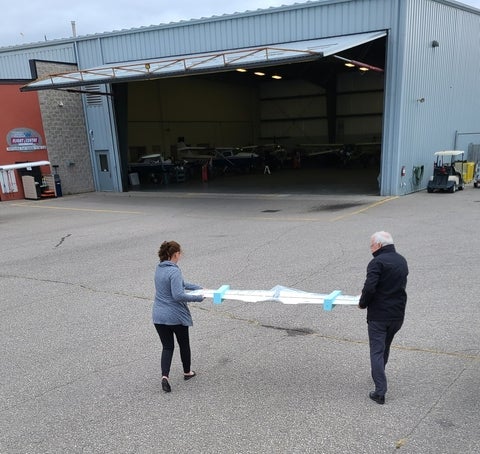Arrival of the world’s first certified electric plane in Canada: Pipistrel Velis Electro
The Sustainable Aeronautics Summit at Waterloo Region International Airport heralded the call by leaders in industry, government, and academia to create innovative sustainable aeronautics futures on Wednesday, 5 October 2022.
Two days later, the University of Waterloo demonstrated its commitment toward the sustainable aviation goal with the arrival of the first Pipistrel Velis Electro in Canada. (Admittedly, the whole process has taken over two years with discussions, applications, rejections, revisions, selection and final refinements, so the two day period is primarily good luck based on many earlier actions.)
The Velis Electro is the first, and currently only, type certified electric plane in the world with European Union (EASA) certification granted in 2020 and UK certification in 2022. Next, we want to see how it will perform under Canadian conditions. Principal Investigator, Paul Parker, and co-investigators, Suzanne Kearns and Mehrdad Pirnia, share the desire of industry partner, Bob Connors from Waterloo Wellington Flight Centre, to bring a new generation of innovative technologies to aviation and successfully applied for Canadian Foundation for Innovation funding to acquire the Velis Electro for testing. The Region of Waterloo contributed toward the charger as they support lower carbon emissions from airport activities.
Working in cooperation with Transport Canada and Pipistrel, the team hopes to provide test results to gain Canadian certification for the eplane so that commercial electric aviation will become a reality in Canada. Following a successful research program and certification, industry could adopt small eplanes widely across the country. Waterloo Aviation students could be among the first to benefit, both from lower emissions during their programs and the advanced skills essential for sustainable aviation futures.
The action on Friday began with Lance, an experienced handler of Solar Ships, and Darren, his truck driver, arriving at the airport with two forklifts in preparation to unload the container. The shipping company confirmed that the truck was on the way with the container and its revolutionary contents.
The truck arrived with an ‘eco-container’ on the back. The eco-container has a bamboo floor that you can fasten cargo directly to and thereby reduce the amount of material used to hold items in place. (Packing material is often discarded as waste.)

Two forklifts arrive WWFC in preparation to unload the Pipistrel Velis Electro from the container.

The arrival of the truck with the eco-container with a bamboo floor that cargo can be directly fastened to and reduce the amount of material used to hold items in place.

Aircraft bolted to the floor of the eco-container

Brian and Steve unbolting the tailplane.
The customs seal on the container was cut and the door opened to reveal all four pieces that we expected: charger, tailplane, wings, and fuselage. Oh look, a thoughtful gift from the manufacturer, a Canadian flag on each side of the eplane.
The straps were so securely bolted to the bamboo floor, that Steve’s regular drill would not start them. Brian pulled out his impact drill and loosened them with ease. The straps were quickly removed and the charger easily unloaded.
The tailplane was very light and handed over to the steady hands of Bob Connors, WWFC general manager, for safe transfer to the hangar.
Next were the wings. Despite their size, they are amazingly light with their carbon fibre reinforced polymer (CFRP) sandwich shell construction. The strength and durability that can be achieved with such light structures is an essential manufacturing miracle for sustainable aviation.

Tailplane

Tailplane being carried into the hangar.

Charger

Unloading the charger.

Wings

Wings being unloaded.
Finally, the fuselage. It was well secured with straps and a small metal frame to hold each of the main wheels in place. Instead of picking the whole container up and off the truck, a large pallet was used so that we could roll the fuselage on and then gently lower it to the ground.
The Velis was rolled to its new home in the hangar. There would be no hitting the on switch today.
Bob looked at his watch. 35 minutes since we opened the container door and all the contents were safely unloaded.

Velis exiting the container.

Velis being transported on the forklift pallet.

Lance guiding the Velis onto the forklift pallet.

Velis on the way into the hangar.
The charger also has wheels, so it was rolled to a special location in the hangar where the conduit emerged from a custom transformer installed to deliver the 3-phase 400 volt input that the charger is designed for. Of course, there is one small catch, we did not have the compatible receptacle for the European plug. The electrician will look at that next week.
Pause. This is a great time to give thanks and celebrate the Friday afternoon before the Canadian Thanksgiving long weekend. A team of over 100 people have contributed to the project and process of bringing the Pipistrel Velis Electro to Waterloo. Thanks to all of them, it is safely stored at YKF, ready to start the next chapter of sustainable aviation in Canada.

Velis charger in the hangar.

Velis safely in its new home with Prof. Paul Parker.